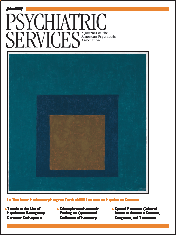In Reply
In Reply: It was once explained to me: a recipe is simple, building a moon rocket is complicated, and raising a child is complex. Dr. Leon's letter raises the complexity of considering some forms of racism a mental illness. His query about how to address individual psychopathology—such as the false belief of racial superiority that some would classify as a delusion—when social convention partly supports racism, explains why this topic of racism is so multifarious. I contend that we should let science help us understand that racial and ethnic diversity does not dictate superiority or inferiority of one group over another. An ecotone is a zone between two ecological zones where two distinct clusters of biological organisms overlap. Scientists have shown this diverse area to be the place of most innovation, learning, creativity, and adaptation in biology. I maintain that our culture should take a lesson from biology to correct the acceptance of racism in our midst.
Dr. Leon's letter also raises the issue that racism is not the only form of a destructive fixed belief. We agree, and members of our racism work group are considering the issue of pathological bias (1). In addition, research suggests that openness to experience, which is one of the "big five" personality traits (extraversion, emotional stability, agreeableness, conscientiousness, and openness to experience), may mitigate against negative stereotypes of blacks by whites (2). This is an interesting finding given that this personality trait is estimated to have a heritability of 40 percent (3).
I completely agree with Dr. Leon's point about the need for psychiatry to be on guard for false beliefs even if most of the culture believes them. In my opinion such beliefs are a mixture of psychiatric, public health, moral, and ethical problems with which psychiatrists should grapple and provide some leadership, by—as Dr. Leon suggests—conducting research on the causes of mental illness. Being African American I can attest to the fact that racism is very much a source of stress, and Dr. Chester Pierce (4) has solid research findings that document this reality.
Finally, Dr. Leon's letter represents what I have always respected about psychiatrists, their willingness to have a mind that is open to new ideas. I appreciate his fair words and his reminder that new and helpful ideas are not always popular.
1. Dunbar E: Symbolic, relational, and ideological signifiers of bias-motivated offenders: toward a strategy of assessment. American Journal of Orthopsychiatry 73:203–211,2003Crossref, Medline, Google Scholar
2. Flynn FJ: Having an open mind: the impact of openness to experience on interracial attitudes and impression formation. Journal of Personality and Social Psychology, in pressGoogle Scholar
3. First MB, Bell CC, Cuthbert B, et al: Personality disorders and relational disorders: a research agenda for addressing critical gaps in DSM, in American Psychiatric Association Research Agenda for DSM V. Edited by Kupfer DJ, First MB, Regier DA. Washington, DC, American Psychiatric Publishing, Inc, 2002Google Scholar
4. Pierce CM, Profit WE: Homoracial and heteroracial behavior in the United States, in Mental Health in Africa and the Americas Today. Edited by Okpaku SO. Nashville, Tenn, Chrisolith, 1991Google Scholar



